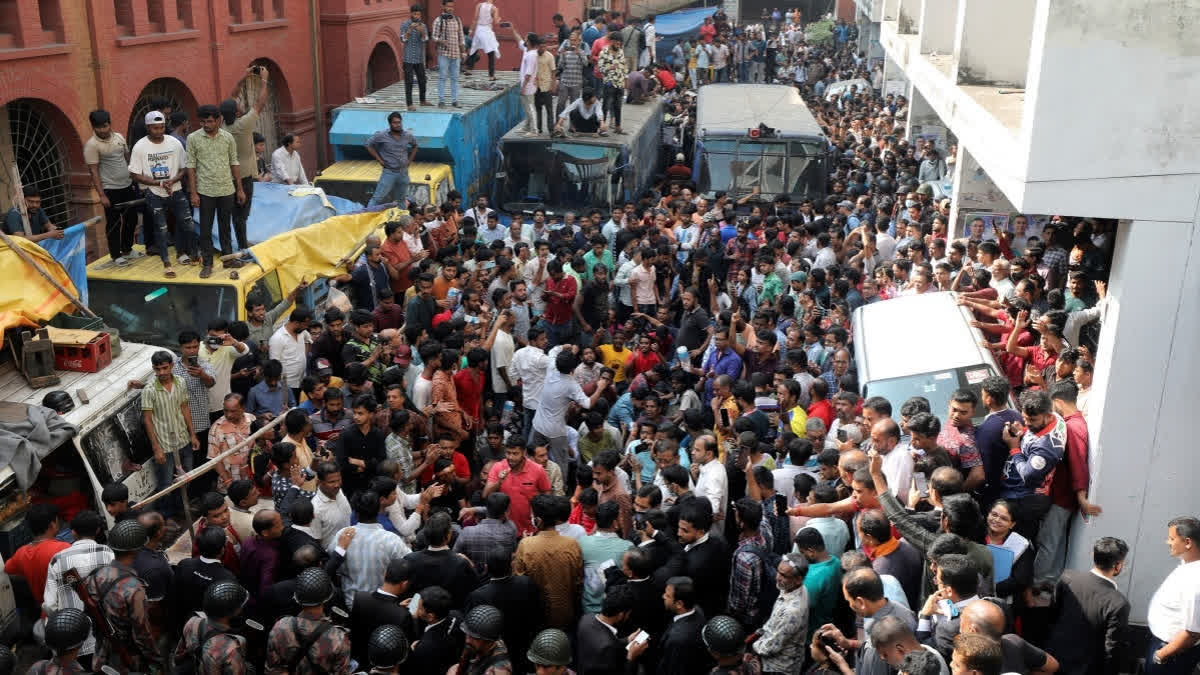New Delhi:New Delhi on Friday strongly raised deep concerns with the Bangladesh government regarding the threats and targeted attacks on Hindus and other minorities and urged the interim government to live up to its responsibility of protecting all minorities.
A Hindu Monk Chinmoy Krishna Das was arrested in Bangladesh on sedition charges. In an exclusive interview with ETV Bharat, India's Former high commissioner to Bangladesh, Veena Sikri said, "The Indian government is fully committed to supporting minority rights. Bangladesh's constitution, which current government officials have sworn to uphold, is based on democracy, secularism, nationalism, and social justice. These principles are crucial, but they are being overlooked."
According to Sikri, Professor Mohammad Yunus is struggling to manage the situation. "The Jamaat-e-Islami and other fundamentalist groups seem to be in control and are not acknowledging the existing problems. This is a significant concern", she said.
The ex-Indian High Commissioner said, "As for India-Bangladesh relations, since the new government took office on August 8, we have expressed our willingness to strengthen ties. Our government is ready to engage with the current administration and build on the successful economic cooperation and infrastructure projects established over the past 15 years under Sheikh Hasina. However, Bangladesh needs to show its interest in moving forward. We anticipate possible discussions between the foreign offices of both countries next month in December, but we will have to see how things develop".
She noted that on August 5, 2024, Sheikh Hasina left Bangladesh for India. Shortly after, there were attacks on minorities in Bangladesh, targeting Hindus, Buddhists, and Christians.
Veena Sikri highlighted that Prime Minister Narendra Modi addressed this issue with Professor Muhammad Yunus, the chief advisor of the interim government in Bangladesh, even mentioning it in a congratulatory letter.
"Professor Yunus called our Prime Minister, promising to take action to stop the violence. However, the attacks continued. The situation escalated to attacks on the economic livelihoods of minorities, forcing teachers and professors to resign. There were also assaults on Buddhists in Khagrachari, where their temples and idols were destroyed, and they were pressured to leave. Some soldiers were reportedly involved in these actions. The situation has worsened, and we have consistently raised our concerns. Unfortunately, the response from Bangladesh has shifted to denial, despite the initial acknowledgment from Professor Yunus", she added.
She said, "The interim government is expected to hold elections within 90 days. However, the current Constitution does not support the idea of an interim government, as the previous High Court ruled that a parliamentary democracy requires an elected government. They are now attempting to amend the constitution to reinstate the caretaker government system, which is meant to ensure free and fair elections. Once an elected government is in place, it can handle further reforms".
She pointed out that many people in Bangladesh are saying that Jamaat-e-Islami, which is currently in power, does not want elections.
"They prefer to extend their time in control and avoid early elections. However, this government is not constitutionally valid right now because the current constitution of Bangladesh does not allow for an interim government. They took an oath to uphold this constitution when they were sworn in. This creates a significant issue," she said.
